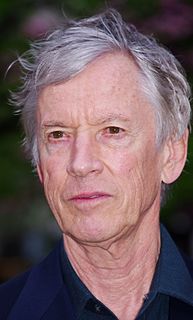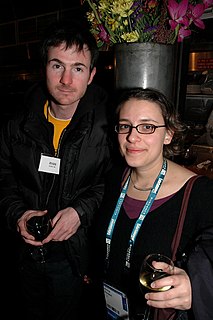A Quote by James Laughlin
With me it's the whole thing, it's the conceit, the idea, what the poem is saying. And it goes on just as long as is necessary to say what needs to be said.
Related Quotes
I keep feeling that there isn't one poem being written by any one of us - or a book or anything like that. The whole life of us writers, the whole product I guess I mean, is the one long poem - a community effort if you will. It's all the same poem. It doesn't belong to any one writer - it's God's poem perhaps. Or God's people's poem.
There's no such thing as post-feminism. It's like saying post-democracy, excuse me, what does that mean? We're nowhere near equality, so the very idea of post-feminism is ridiculous. The same people who 30-40 years ago said the women's movement is not necessary, 'it's going against nature, my wife is not interested' [are] the same people now saying 'well it used to be necessary but not anymore.' The very invention of the word post-feminism is the current form of resistance.
There's a whole lot of people in trouble tonight From the disease of conceit Whole lot of people seeing double tonight From the disease of conceit Give ya delusions of grandeur And a evil eye Give you the idea that You're too good to die Then they bury you from your head to your feet From the disease of conceit
He cleared his throat, "Zoe, i think you said you love me." "I did say it. I do love you with all my heart." "I see." There was a long pause, then he said, "For how long has this been going on?" "I don't know," she said, "Sometimes i think it started a long, long time ago." "You might have mentioned it." "I didn't want to encourage it," she said, "I thought it was a bad idea.
That one long scene in the Leftovers I have with David Gulpilil was seven pages long. When we finished it, Mimi Leder said, "I thought you were gonna do this in bits and pieces. You just did the whole thing." And I literally couldn't remember the scene. It wasn't that I was in a trance. I said, "Just keep shooting takes until you see what you want." In 48 years of acting, which is also how long I've been married, that had never happened to me.
'This thing I feel, I can't name it straight out but it seems important, do you feel it too?' — this sort of direct question is not for the squeamish. For one thing, it's perilously close to 'Do you like me? Please like me,' which you know quite well that 99% of all the interhuman manipulation and bullshit gamesmanship that goes on goes on precisely because the idea of saying this sort of thing straight out is regarded as somehow obscene.
My whole thing is I don't take from Castro being an intelligent man as long as he is doing the thing that needs to be done. But the thing is at the end of the day you're not bettering the island. You're only making it worse. So, for me it's just making sure that people have the right to speak their minds and have an opportunity in life to better their life.
In a way, that's also a recognition that Dante needs Virgil and that the Inferno needs the Aeneid and that the epic needs a model and that for Dante to write this great poem he needs someone to come before him and he turns to Virgil's text, especially book six where Aeneas goes down into the underworld. And for me, that's a model of the poet's relationship to previous poetry, to another poetry as calling out for guidance.
If I hear Anna say something, and I completely misheard her say it, and she goes, 'That's not what I said, but that's a great idea.' Whose idea was it? It was nobody's idea. It came out of thin air, but it was a misunderstanding. That's really what's fun about having a partner to throw ideas off of. Sometimes you get those good accidents.





































